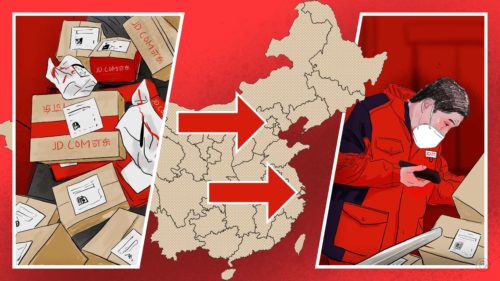‘China didn’t warn public of likely pandemic for six key days’


The China Project illustration by Derek Zheng
The Associated Press reports that “the head of China’s National Health Commission, Mǎ Xiǎowěi 马晓伟, laid out a grim assessment” of the COVID-19 epidemic on January 14 in a teleconference with provincial health officials, but that Beijing waited until January 20 to warn the public. The assertion is based on internal documents reviewed by the AP.
In those six days, Wuhan hosted a mass banquet for tens of thousands of people, and tens of millions of people began traveling through for Lunar New Year celebrations.
By January 20, when China first confirmed human-to-human transmission of the coronavirus, and comments by Xí Jìnpíng 习近平 about the virus first appeared in state media, “more than 3,000 people had been infected during almost a week of public silence, according to internal documents obtained by The Associated Press and expert estimates based on retrospective infection data.” The virus had also begun to spread internationally, with the U.S. reporting its first case of infection.
The delay “was neither the first mistake made by Chinese officials at all levels in confronting the outbreak, nor the longest lag, as governments around the world have dragged their feet for weeks and even months in addressing the virus.” But the outbreak may have been better contained during that critical early period.
However, some commentators say that “the Chinese government may have waited on warning the public to stave off hysteria, and that it did act quickly in private during that time.” But that view is not likely to persuade many. In a different report from Reuters, the former head of Britain’s MI6 foreign intelligence service said that “China concealed crucial information about the novel coronavirus outbreak from the rest of the world and so should answer for its deceit.”
Related: a tacit admission that there was a cover-up? “China’s Centres for Disease Control and Prevention should play a stronger role in raising the alarm over disease outbreaks, China’s leading epidemiologist [and loyal Party member] Zhōng Nánshān 钟南山” told the People’s Daily, according to the South China Morning Post:
“The CDC should be granted certain powers, rather than merely being a technical unit to collect and report data…In finding problems, discovering origins of viruses, assessing the severity of contagion, it should have the authority to interpret.”
In a separate development, U.S. Embassy officials visited the now famous Wuhan Institute of Virology several times in January 2018, “and sent two official warnings back to Washington about inadequate safety at the lab, which was conducting risky studies on coronaviruses from bats,” the Washington Post reports. This has “fueled discussions inside the U.S. government” that the Wuhan lab was the source of the virus, “even though conclusive proof has yet to emerge.”
—Jeremy Goldkorn






